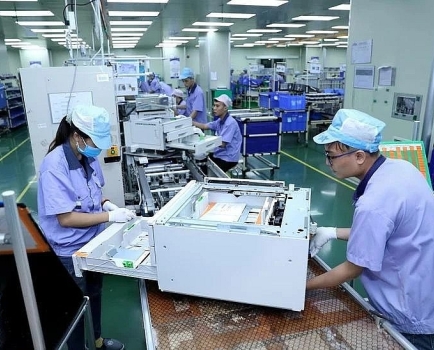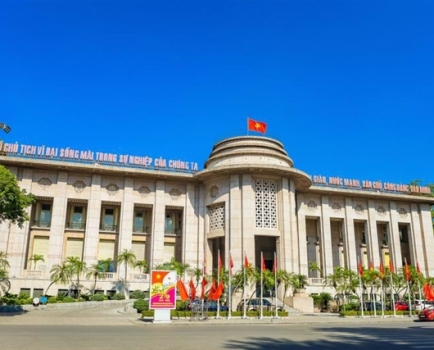Vietnam conglomerates race to invest in payment intermediaries
Mon, 03 Jun 2019 16:01:00 | Print | Email Share:
Vietnam’s trade groups are investing in payment intermediaries to support their commercial ecosystems, and the competition is set to become fierce.
Vingroup’s loyalty program VinID last week completed the acquisition of shares in People Care JSC, the company that created digital wallet app MonPay. Right before the deal was completed, VinID had replaced People Care’s entire board of directors with their own personnel.
At the end of 2018, executives of ride-hailing firm Grab Vietnam were appointed to the board of Moca – a Fintech-based payment intermediary. Operations relating to the company’s platform to process payment for rides, GrabPay, was subsequently shifted to Moca, to become GrabPay by Moca.
Moca and MonPay are just two of several cases of Fintech firms receiving investments from large partners. The market for payment platforms and e-wallets, which exploded in 2015 and 2016, are now being reshaped with the emergence of investors with significant financial resources backing these platforms.
According to analysts, these developments may lead the market into a new phase with harsher competition.
"The participation of these large players is very encouraging as they only invest when there is potential and the customer base is growing," said Nguyen Ba Diep, deputy chairman of Momo, one of Vietnam’s first e-wallet payment intermediaries.
By the end of 2018, there were 4.2 million e-wallets linked to bank accounts, with total transaction value of the whole year reaching VND91 trillion ($3.9 billion), but these numbers are still modest compared to actual market potential, he said.
Heavy losses
However, most digital wallets in the market are making losses. Earlier this year, Pham Tien Dung, head of the State Bank of Vietnam's payment department, said that only 20 percent of intermediaries in the market were making profits from transactions, and that the rest of the market was "unstable".
Losses with startups in general and Fintech firms in particular are expected because these units often choose to sacrifice profits in exchange for acquiring greater market share.
In early 2016, Zion JSC, an intermediary of Vietnamese online gaming and messaging firm VNG Corp, was granted a payment intermediary license, and debuted its ZaloPay shortly after. For two years after ZaloPay was launched, the company experienced mounting losses.
According to VNG’s annual financial reports, Zion lost VND21 billion ($900,000) in 2017, and this rose six times to VND133 billion ($5.7 million) in 2018.
According to its 2017 and 2018 financial statements, Momo’s net cash flow from its intermediary payment app was several hundred billion dong in the negative each year (VND100 billion = $4.3 million), with most of its losses offset by profits from other financial activities.
Integration into commercial ecosystems
The market situation has seen new entrants deciding to join the market through mergers and acquisitions (M&A) deals.
For large commercial groups aiming to develop an ecosystem of services, owning a payment platform is a "must-do sooner or later," analysts say. The latest investments in the payment intermediaries sector have mostly come from corporations with their own ecosystems.
For instance, Grab, which acquired Moca last year, has expanded its business to many services, including shipping and food delivery, after debuting with its ride-hailing app in 2014.
VinID is Vingroup’s loyalty program, which allows customers to accumulate points from goods and services bought from Vingroup’s whole ecosystem, which includes real estate, education and shopping.
SEA (formerly Garena), a gaming company, invested $64 million in food & beverage sharing platform named Foody in 2017, then paid a total of $50 million to acquire a majority stake in VNPay as well as an undisclosed stake in a local logistics firm.
SEA group also has its own leading Southeast Asian gaming platform Garena, as well as Shoppee, a popular e-commerce app in Vietnam.
According to analysts, another reason for participation from "giants" are that the market is highly fragmented and there is no single unit strong enough to attract the majority of customers to its own platform.
In fact, it appears that each e-wallet tries to focus on its own niche segment. Buzzmetrics reports that 60 percent of customers go to Momo because of promotions, 70 percent use Viettelpay for transfers, and 100 percent go to Airpay for ordering goods.
As a result, major players with financial capacity to invest see this as an opportunity to dominate the market. Competition is expected to become fierce.
"To develop electronic payments, each unit must have a distinct strength and ecosystem, in which customers will choose the best and most suitable service," said Diep, deputy chairman of Momo, predicting that, eventually, the market will only be large enough for two or three players.
By: Minh Son/VnExpress
---------------------------------------------
Same category News :













